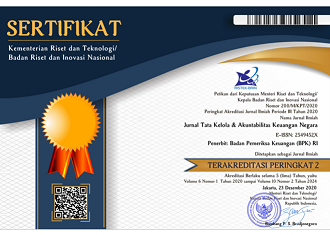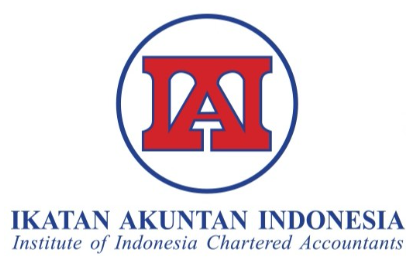Competency assessment in fraud detection at BPK: Challenges and enhancements
DOI:
https://doi.org/10.28986/jtaken.v11i1.1913Keywords:
fraud, competency, BPK, audit, code of ethicsAbstract
Public concerns have been raised regarding the audits conducted by the Audit Board of the Republic of Indonesia (Badan Pemeriksa Keuangan or BPK), the supreme audit institution, which often issues unqualified opinions despite the increasing number of corruption cases. Internally, BPK recognizes this issue as a critical risk that must be mitigated to preserve public trust. BPK must maintain its competence and safeguard public funds. This case evaluates auditors’ competency levels, identifies internal factors supporting their competence, and examines BPK’s initiatives for improving fraud detection skills. Using survey, interview, and document review data, this case study assesses competency according to BPK standards. It investigates internal factors through the auditor's code of ethics and reviews performance reports to evaluate fraud detection skills. Our study finds that BPK auditors possess strong fraud detection skills. Second, the key internal factors strengthening fraud detection include competence and professional due care. Third, BPK has introduced limited education, training, and CFE/CFrA certification policies. Senior fraud detection auditors report feeling more competent due to their increased training, experience, and access to certifications. This study employs novel internal standards, self-assessment surveys, and interviews to analyze fraud detection proficiency.
References
AICPA. (2002). Consideration of fraud in a financial statement audit. Statement on Auditing Standards Number 99. New York, NY: AICPA.
Asare, S. K., Wright, A., & Zimbelman, M. F. (2015). Challenges facing auditors in detecting financial statement fraud: Insights from fraud investigations. Journal of Forensic & Investigative Accounting, 7(2), 63–112. http://web.nacva.com/JFIA/Issues/JFIA-2015-2_4.pdf
Aulia, R., Maulana, A., & Supriadi, T. (2024). Influence of integrity, independence, professional skepticism, and the audit situation on the audit opinion. Jurnal Tata Kelola Dan Akuntabilitas Keuangan Negara, 10(1), 55–66. https://doi.org/10.28986/jtaken.v10i1.1626
Bivol, T. (2022). Studies on auditing communication in organizations. Acta Universitatis Danubius Relationes Internationales, 15(2), 91–103. https://dj.univ-danubius.ro/index.php/AUDRI/article/view/2361
BPK RI. (2017). BPK Regulation Number 1 Year 2017 concerning State Financial Audit Standards (Peraturan BPK RI Nomor 1 Tahun 2017 tentang Standar Pemeriksaan Keuangan Negara). https://www.bpk.go.id/assets/files/storage/2017/01/file_storage_1484641204.pdf
BPK RI. (2020). BPK Regulation Number 3 Year 2020 concerning BPK's Strategic Plan for 2020-2024 (Peraturan BPK RI Nomor 3 Tahun 2020 tentang Rencana Strategis BPK Tahun 2020-2024). https://peraturan.bpk.go.id/Home/Details/150481/peraturan-bpk-no-3-tahun-2020
BPK RI. (2023). Laporan Kinerja BPK Tahun 2023. https://www.bpk.go.id/page/laporan-kinerja--lakin-
BPK RI. (2024, January). Menjaga kualitas pemeriksaan BPK. Majalah Warta Pemeriksa. https://wartapemeriksa.bpk.go.id/?p=47839&=1
Cheng, Y. S., Liu, Y. P., & Chien, C. Y. (2009). The association between auditor quality and human capital. Managerial Auditing Journal, 24(6), 523–541. https://doi.org/10.1108/02686900910966512
Creswell, J. W. (2009). Research design: Qualitative, quantitative, and mixed methods approaches (3rd ed.). SAGE Publication, Inc.
DeAngelo, L. E. (1981). Auditor size and audit quality. Journal of Accounting and Economics, 3(3), 183–199. https://doi.org/https://doi.org/10.1016/0165-4101(81)90002-1
Destyani, N. A., & Tanusdjaja, H. (2021). Pengaruh standar auditing, standar pengendalian mutu, dan kode etik terhadap kualitas jasa audit. Journal Paradigma Akuntansi, 3(1). https://doi.org/https://doi.org/10.24912/jpa.v3i1.11664
Fatimah, K., & Pramudyastuti, O. L. (2023). Analisis peran independensi dan kompetensi terhadap kemampuan auditor dalam pencegahan dan pendeteksian kecurangan akuntansi (fraud). Jurnal Economina, 2(3), 860–868. https://doi.org/https://doi.org/10.55681/economina.v2i3.407
Gunarwanto. (2019, July 10). Opini WTP versus korupsi. Detik News. https://news.detik.com/kolom/d-4618675/opini-wtp-versus-korupsi
Gabriele, H. (2014). Quality research in audits. European Scientific Journal, ESJ, 10(7). https://doi.org/10.19044/esj.2014.v10n7p%25p
Heriyanto. (2018). Thematic analysis sebagai metode menganalisa data untuk penelitian kualitatif. ANUVA, Jurnal Kajian Budaya, Perpustakaan, dan informasi, 2(3), 317–324. https://doi.org/https://doi.org/10.14710/anuva.2.3.317-324
ICW. (2022). Laporan hasil pemantauan tren penindakan korupsi tahun 2022. https://antikorupsi.org/sites/default/files/dokumen/Narasi%20Laporan%20Tren%20Penindakan%20Korupsi%20Tahun%202022.pdf
Indra, I., Iskak, J., & Khaq, A. (2022). Enhancing the role of the Audit Board of the Republic of Indonesia in fraud detection. Jurnal Tata Kelola dan Akuntabilitas Keuangan Negara, 8(2), 131–143. https://doi.org/10.28986/jtaken.v8i2.935
Institut Akuntan Publik Indonesia (IAPI). (2021). Kode etik profesi akuntan publik. IAPI. https://iapi.or.id/kode-etik-profesi-akuntan-publik/
Johnstone, K. M., Gramling, A. A., & Rittenberg, L. E. (2016). Auditing: A risk-based approach to conducting a quality audit (10th ed.). Cengage Learning.
Noch, M. Y., Ibrahim, M. B. H., Akbar, M. A., Kartim., & Sutisman, E. (2022). Independence and competence on audit fraud detection: Role of professional skepticism as a moderator. Jurnal Akuntansi, 26(1), 161-175. https://doi.org/10.24912/ja.v26i1.823
Kleinman, G., Strickland, P., & Anandarajan, A. (2020). Why do auditors fail to identify fraud? An exploration. Journal of Forensic and Investigative Accounting, 12(2), 334–351. http://web.nacva.com/JFIA/Issues/JFIA-2020-No2-9.pdf
Maulana, D. (2020). Pengaruh kompetensi, etika dan integritas auditor terhadap kualitas audit. Jurnal Ilmiah Indonesia, 5(1), 39–53. https://doi.org/https://doi.org/10.36418/syntax-literate.v5i1.855
Millichamp, A., & Taylor, J. (2018). Auditing (11th ed.). Cengage Learning EMEA.
Octaviani, D., & Ekasari, K. (2021). The effect of due professional care, integrity, confidentiality, and independence on audit quality (an insight of East-Java Auditors in Indonesian during pandemic). Proceedings of 2nd Annual Management, Business and Economic Conference (AMBEC 2020), 106–110. https://doi.org/10.2991/aebmr.k.210717.022
Petricia, V., & Soedarsa, H. G. (2023). Faktor-faktor yang mempengaruhi kemampuan auditor dalam mendeteksi kecurangan (Studi pada Badan Pemeriksa Keuangan Perwakilan Provinsi Lampung). Jurnal Maneksi, 12(3), 549–553. https://doi.org/10.31959/jm.v12i3.1602
Podsakoff, P. M., MacKenzie, S. B., Lee, J. Y., & Podsakoff, N. P. (2003). Common method biases in behavioral research: A critical review of the literature and recommended remedies. Journal of Applied Psychology, 88(5), 879–903. https://doi.org/10.1037/0021-9010.88.5.879
Pramono, A. J., & Keliat, M. (2022). An overview of competency development through formal education and professional certification programs to increase the capacity of BPK. Jurnal Tata Kelola Dan Akuntabilitas Keuangan Negara, 8(2), 227–239. https://doi.org/10.28986/jtaken.v8i2.1118
Sanjaya, A. (2017). Pengaruh skeptisisme profesional, independensi, kompetensi, pelatihan auditor, dan resiko audit terhadap tanggung jawab auditor dalam mendeteksi kecurangan. Jurnal Akuntansi Bisnis, 15(1), 41–55. https://doi.org/10.24167/jab.v15i1.1350
Umar, H., Safaria, S., Mudiar, W., & Purba, R. B. (2022). Analysis of the implementation of corruption detection using the HU-Model in state financial management institutions. Journal of Positive School Psychology, 6(12), 765–778. https://journalppw.com/index.php/jpsp/issue/view/44
Wahidahwati, W., & Asyik, N. F. (2022). Determinants of auditors' ability in fraud detection. Cogent Business and Management, 9(1). https://doi.org/10.1080/23311975.2022.2130165
Wicaksono, A. P. N. (2023). Competence, professionalism, audit experience, and the auditor’s ability to detect fraud. Jurnal Akademi Akuntansi, 5(4), 565–578. https://doi.org/10.22219/jaa.v5i4.24306
Yin, R. K. (2018). Case study research and applications (Sixth Edition). SAGE Publications, Inc.
Downloads
Submitted
Accepted
Published
How to Cite
Issue
Section
License
Copyright (c) 2025 Jurnal Tata Kelola dan Akuntabilitas Keuangan Negara

This work is licensed under a Creative Commons Attribution-ShareAlike 4.0 International License.

Jurnal Tata Kelola dan Akuntabilitas Keuangan Negara is licensed under
a Creative Commons Attribution-ShareAlike 4.0 International License





















